综合英语一上册第十四课lesson fourteen
- 格式:doc
- 大小:76.50 KB
- 文档页数:5
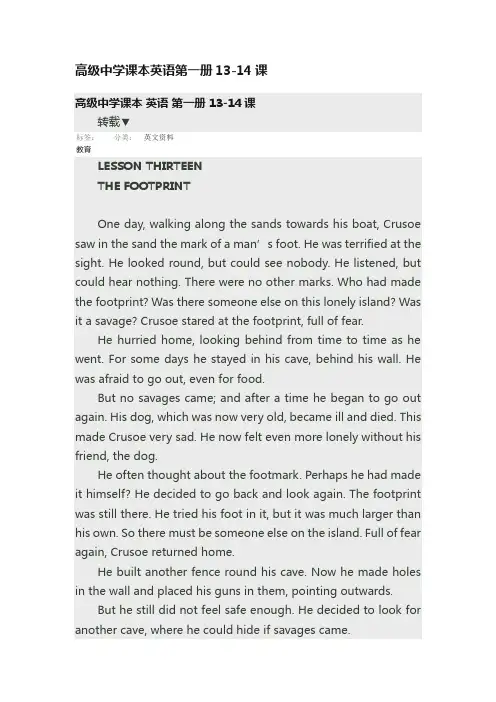
高级中学课本英语第一册13-14课高级中学课本英语第一册 13-14课转载▼标签:分类:英文资料教育LESSON THIRTEENTHE FOOTPRINTOne day, walking along the sands towards his boat, Crusoe saw in the sand the mark of a man’s foot. He was terrified at the sight. He looked round, but could see nobody. He listened, but could hear nothing. There were no other marks. Who had made the footprint? Was there someone else on this lonely island? Was it a savage? Crusoe stared at the footprint, full of fear.He hurried home, looking behind from time to time as he went. For some days he stayed in his cave, behind his wall. He was afraid to go out, even for food.But no savages came; and after a time he began to go out again. His dog, which was now very old, became ill and died. This made Crusoe very sad. He now felt even more lonely without his friend, the dog.He often thought about the footmark. Perhaps he had made it himself? He decided to go back and look again. The footprint was still there. He tried his foot in it, but it was much larger than his own. So there must be someone else on the island. Full of fear again, Crusoe returned home.He built another fence round his cave. Now he made holes in the wall and placed his guns in them, pointing outwards.But he still did not feel safe enough. He decided to look for another cave, where he could hide if savages came.He found a good place in the rocks, more than twelve feet high, with a narrow entrance. He stepped into the cave. Suddenly he saw two eyes glaring at him out of the darkness. Was it a man, or a wild animal? He hurried out into the daylight.Crusoe lit a fire and from it took a burning stick. He stepped back into the cave, holding the stick high above his head. He heard a noise, as if someone was breathing. He stopped. Nothing happened. He went farther into the cave.On the ground lay an old sick goat, which had gone into the cave to die. It was the goat’s eyes that he had seen in the darkness. As he looked at it, the goat rolled over and died.Crusoe looked about the cave. The ground and the sides were quite dry. Inside, the top of the cave was nearly twenty feet high. It was a good hiding-place.Crusoe had eleven guns altogether. He brought five of them to his new cave and a great deal of gun-powder. The cave was quite dark inside, so he made some candles to give light.Now he had a safe place if the savages came. Every day he climbed to a high rock near his cave to keep watch. And so the months and years went by.It was autumn, the time for Crusoe to gather his small harvest of corn. Early one morning, before starting work, he climbed up to his lookout.There, on the shore, were nine savages, sitting round a fire. Nearby were two canoes in which they had come to the island. They seemed to be eating something they had cooked on the fire. Crusoe watched, full of fear.As soon as the savages had gone, Crusoe returned home for two guns. Then he made his way down to the shore. He looked out to sea. The two canoes were almost out of sight.He went towards the fire, which was still smoking. Among the ashes he found bones. They were not the bones of an animal, but of a human being!Crusoe knew that the savages killed their enemies and ate them. He made up his mind to shoot them if they came again. But many months went by and no one visited the island.WORDS AND EXPRESSIONSFootprint n. 脚印,足迹Boat n. 小船;艇;小轮船Crusoe克鲁索(姓)Mark n. 痕迹;记号;商标terrify vt. 使恐怖;恐吓lonely adj. 孤独的;荒凉的island n. 岛;岛状物savage n. 野人;残酷的人 adj.野蛮的;残酷的stare vi & vt. 盯,凝视Stare at 盯着看from time to time不时地cave n. 洞,穴;岩洞after a time过了一段时间footmark n. 脚印,足迹fence n. 篱笆;栅栏outward(s) adv. 向外safe adj. 安全的;平安的rock n. 岩石;大石头narrow adj. 狭窄的step vi. & vt. 走,举步行走n. 脚步;步骤glare vi. 闪耀;瞪眼 n. 眩目的光;瞪眼 glare at向人瞪眼;怒目注视dark adj. 黑暗的darkness n.黑暗daylight n.日光;白天;黎明stick n. 小树枝;棒;棍;(手)杖roll vi. 打滚;滚动roll over 翻滚about prep. 在……周围;在……的各处adv. 周围;到处hiding-place n. 躲藏处;储藏处altogether adv. 完全;总共;总而言之powder n. 粉;粉末 gun-powder n. 火药candle n. 蜡烛gather vt. 聚焦;采集;收(庄稼等)lookout n. 守望,警戒;瞭望台shore n. 岸;滨canoe n. 独木桥make one’s way排除困难前进out of sight 看不见ash n. 灰;(常用复数)灰烬,灰堆bone n. 骨;骨头human being人NOTES TO THE TEXT1. 这篇课文是从英国小说家丹尼尔.笛福(Daniel Defoe, 1660-1731)著的《鲁滨逊漂流记》(Robinson Crusoe)的一个简写本中选取一段。
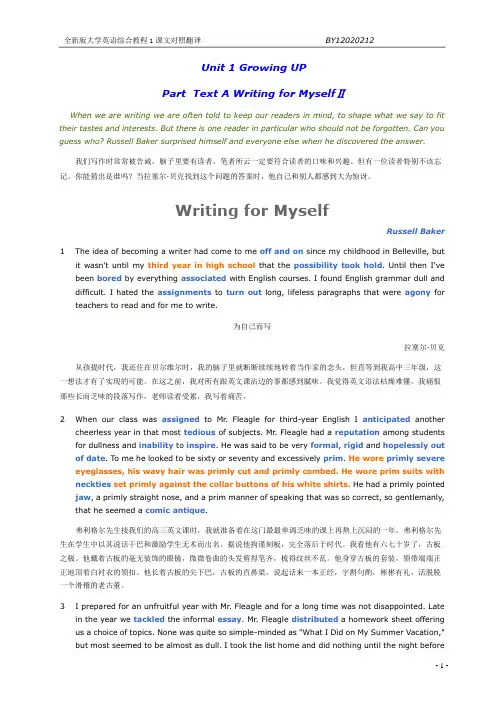
Unit 1 Growing UPPart Text A Writing for MyselfⅡWhen we are writing we are often told to keep our readers in mind, to shape what we say to fit their tastes and interests. But there is one reader in particular who should not be forgotten. Can you guess who? Russell Baker surprised himself and everyone else when he discovered the answer.我们写作时常常被告诫,脑子里要有读者,笔者所云一定要符合读者的口味和兴趣。
但有一位读者特别不该忘记。
你能猜出是谁吗?当拉塞尔·贝克找到这个问题的答案时,他自己和别人都感到大为惊讶。
Writing for MyselfRussell Baker1The idea of becoming a writer had come to me off and on since my childhood in Belleville, but it wasn't until my third year in high school that the possibility took hold. Until then I've been bored by everything associated with English courses. I found English grammar dull and difficult. I hated the assignments to turn out long, lifeless paragraphs that were agony for teachers to read and for me to write.为自己而写拉塞尔·贝克从孩提时代,我还住在贝尔维尔时,我的脑子里就断断续续地转着当作家的念头,但直等到我高中三年级,这一想法才有了实现的可能。
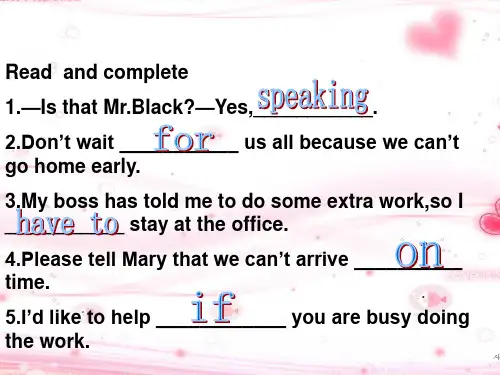
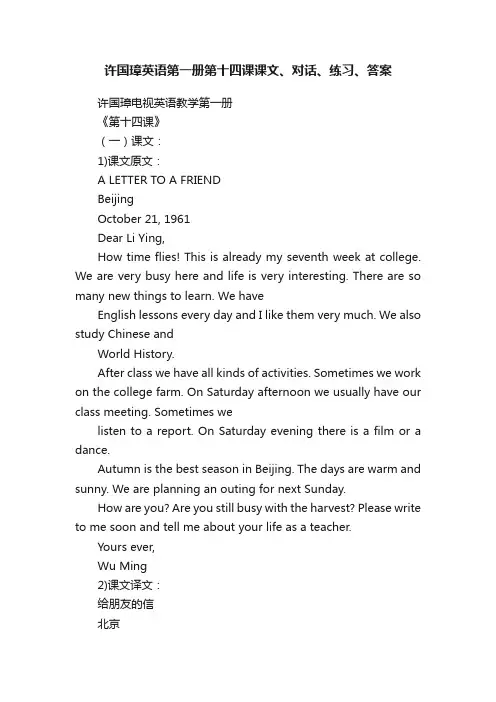
许国璋英语第一册第十四课课文、对话、练习、答案许国璋电视英语教学第一册《第十四课》(一)课文:1)课文原文:A LETTER TO A FRIENDBeijingOctober 21, 1961Dear Li Ying,How time flies! This is already my seventh week at college. We are very busy here and life is very interesting. There are so many new things to learn. We haveEnglish lessons every day and I like them very much. We also study Chinese andWorld History.After class we have all kinds of activities. Sometimes we work on the college farm. On Saturday afternoon we usually have our class meeting. Sometimes welisten to a report. On Saturday evening there is a film or a dance.Autumn is the best season in Beijing. The days are warm and sunny. We are planning an outing for next Sunday.How are you? Are you still busy with the harvest? Please write to me soon and tell me about your life as a teacher.Yours ever,Wu Ming2)课文译文:给朋友的信北京1961年10月21日亲爱的李颖,时间过得真快!这已经是我上大学的第七周了。

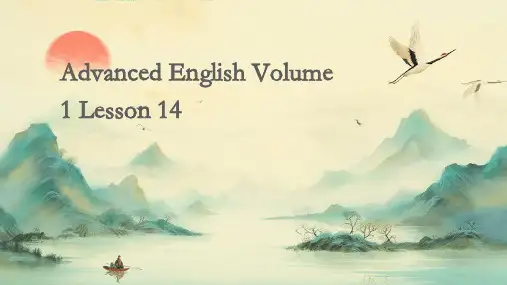
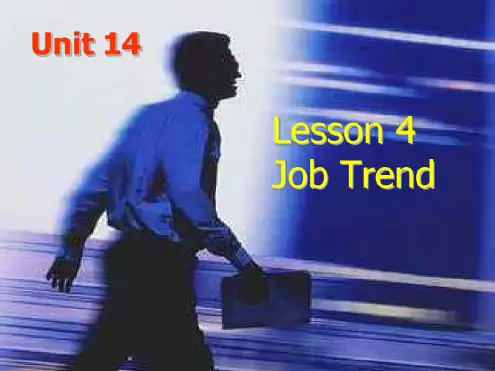
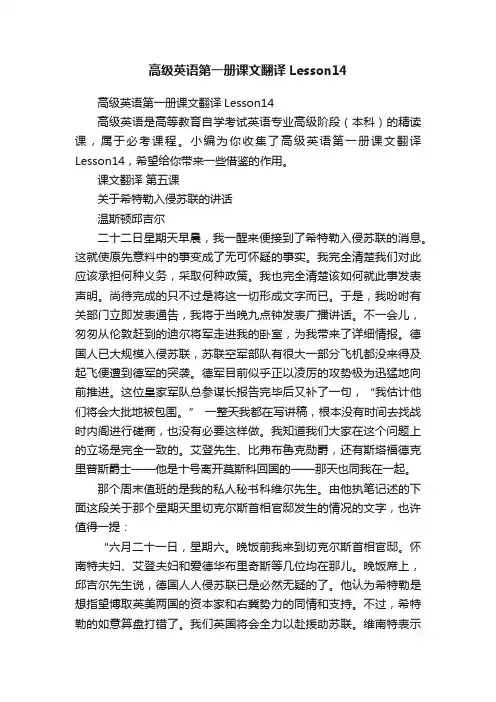
高级英语第一册课文翻译Lesson14高级英语第一册课文翻译Lesson14高级英语是高等教育自学考试英语专业高级阶段(本科)的精读课,属于必考课程。
小编为你收集了高级英语第一册课文翻译Lesson14,希望给你带来一些借鉴的作用。
课文翻译第五课关于希特勒入侵苏联的讲话温斯顿邱吉尔二十二日星期天早晨,我一醒来便接到了希特勒入侵苏联的消息。
这就使原先意料中的事变成了无可怀疑的事实。
我完全清楚我们对此应该承担何种义务,采取何种政策。
我也完全清楚该如何就此事发表声明。
尚待完成的只不过是将这一切形成文字而已。
于是,我吩咐有关部门立即发表通告,我将于当晚九点钟发表广播讲话。
不一会儿,匆匆从伦敦赶到的迪尔将军走进我的卧室,为我带来了详细情报。
德国人已大规模入侵苏联,苏联空军部队有很大一部分飞机都没来得及起飞便遭到德军的突袭。
德军目前似乎正以凌厉的攻势极为迅猛地向前推进。
这位皇家军队总参谋长报告完毕后又补了一句,“我估计他们将会大批地被包围。
” 一整天我都在写讲稿,根本没有时间去找战时内阁进行磋商,也没有必要这样做。
我知道我们大家在这个问题上的立场是完全一致的。
艾登先生、比弗布鲁克勋爵,还有斯塔福德克里普斯爵士——他是十号离开莫斯科回国的——那天也同我在一起。
那个周末值班的是我的私人秘书科维尔先生。
由他执笔记述的下面这段关于那个星期天里切克尔斯首相官邸发生的情况的文字,也许值得一提:“六月二十一日,星期六。
晚饭前我来到切克尔斯首相官邸。
怀南特夫妇、艾登夫妇和爱德华布里奇斯等几位均在那儿。
晚饭席上,邱吉尔先生说,德国人人侵苏联已是必然无疑的了。
他认为希特勒是想指望博取英美两国的资本家和右冀势力的同情和支持。
不过,希特勒的如意算盘打错了。
我们英国将会全力以赴援助苏联。
维南特表示美国也会采取同样的态度。
晚饭后,当我同邱吉尔先生在槌球场上散步时,他又一次谈到了这一话题。
我当时问他,对于他这个头号反对共产大将来说,这种态度是否意味着改变自己的政治立场。
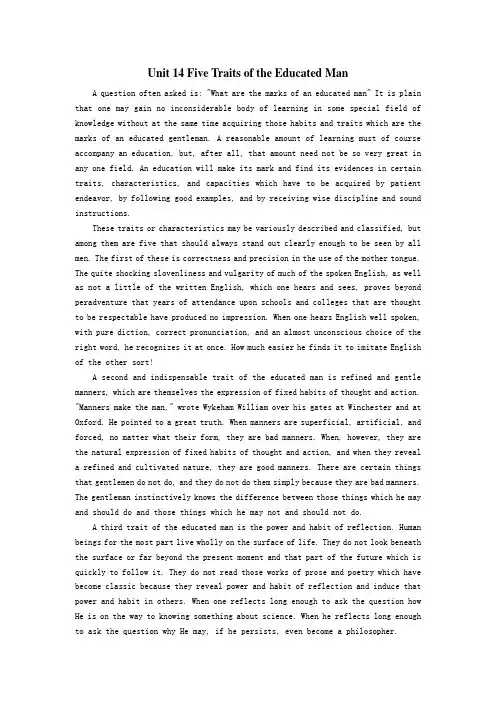
Unit 14 Five Traits of the Educated ManA question often asked is: "What are the marks of an educated man" It is plain that one may gain no inconsiderable body of learning in some special field of knowledge without at the same time acquiring those habits and traits which are the marks of an educated gentleman. A reasonable amount of learning must of course accompany an education, but, after all, that amount need not be so very great in any one field. An education will make its mark and find its evidences in certain traits, characteristics, and capacities which have to be acquired by patient endeavor, by following good examples, and by receiving wise discipline and sound instructions.These traits or characteristics may be variously described and classified, but among them are five that should always stand out clearly enough to be seen by all men. The first of these is correctness and precision in the use of the mother tongue. The quite shocking slovenliness and vulgarity of much of the spoken English, as well as not a little of the written English, which one hears and sees, proves beyond peradventure that years of attendance upon schools and colleges that are thought to be respectable have produced no impression. When one hears English well spoken, with pure diction, correct pronunciation, and an almost unconscious choice of the right word, he recognizes it at once. How much easier he finds it to imitate English of the other sort!A second and indispensable trait of the educated man is refined and gentle manners, which are themselves the expression of fixed habits of thought and action. "Manners make the man," wrote Wykeham William over his gates at Winchester and at Oxford. He pointed to a great truth. When manners are superficial, artificial, and forced, no matter what their form, they are bad manners. When, however, they are the natural expression of fixed habits of thought and action, and when they reveal a refined and cultivated nature, they are good manners. There are certain things that gentlemen do not do, and they do not do them simply because they are bad manners. The gentleman instinctively knows the difference between those things which he may and should do and those things which he may not and should not do.A third trait of the educated man is the power and habit of reflection. Human beings for the most part live wholly on the surface of life. They do not look beneath the surface or far beyond the present moment and that part of the future which is quickly to follow it. They do not read those works of prose and poetry which have become classic because they reveal power and habit of reflection and induce that power and habit in others. When one reflects long enough to ask the question how He is on the way to knowing something about science. When he reflects long enough to ask the question why He may, if he persists, even become a philosopher.A fourth trait of the educated man is the power of growth. He continues to grow and develop from birth to his dying day. His interests expand, his contacts multiply, his knowledge increases, and his reflection becomes deeper and wider. It would appear to be true that not many human beings, and even not many of those who have had a college education, continue to grow after they are twenty-four or twenty-five years of age. By that time it is usual to settle down to life on a level of more or less contented intellectual interest and activity. The whole present day movement for adult education is a systematic and definite attempt to keep human beings growing long after they have left school and college, and, therefore, to help educate them.A fifth trait of the educated man is his possession of efficiency, or the power to do. The mere visionary dreamer, however charming or however wise, lacks something which an education requires. The power to do may be exercised in any one of a thousand ways, but when it clearly shows itself, that is evidence that the period of study, of discipline, and of companionship with parents and teachers has not been in vain. Given these five characteristics, one has the outline of an educated man. That outline may be filled in by scholarship, by literary power, by mechanical skills, by professional zeal and capacity, by business competence, or by social and political leadership. So long as the framework or outline is there, the content may be pretty much what you will, assuming, of course, that the fundamental elements of the great tradition which is civilization, and its outstanding records and achievements in human personality, in letters, in science, in the fine arts, and in human institutions, are all present.教养的五个特征常常有这么一个问题:“一个有教养的人的标志是什么”很显然,可能一个人在获取了某个专业知识领域大量的知识的同时,却未能养成作为一个有教养的人标志性的那些习惯和特征。
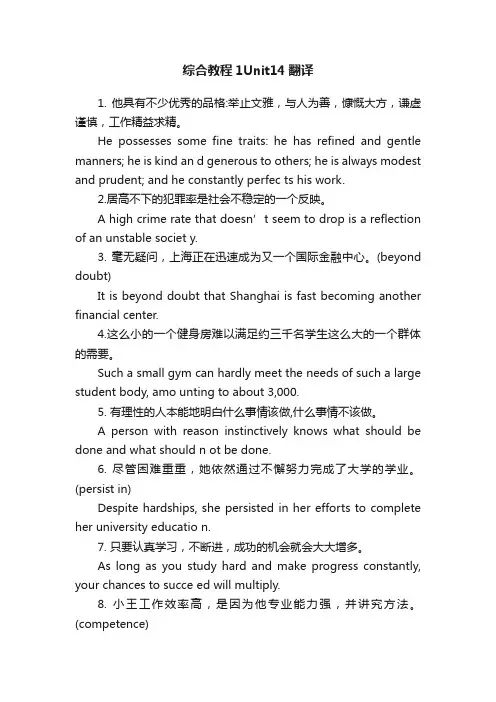
综合教程1Unit14翻译1. 他具有不少优秀的品格:举止文雅,与人为善,慷慨大方,谦虚谨慎,工作精益求精。
He possesses some fine traits: he has refined and gentle manners; he is kind an d generous to others; he is always modest and prudent; and he constantly perfec ts his work.2.居高不下的犯罪率是社会不稳定的一个反映。
A high crime rate that doesn’t seem to drop is a reflection of an unstable societ y.3. 毫无疑问,上海正在迅速成为又一个国际金融中心。
(beyond doubt)It is beyond doubt that Shanghai is fast becoming another financial center.4.这么小的一个健身房难以满足约三千名学生这么大的一个群体的需要。
Such a small gym can hardly meet the needs of such a large student body, amo unting to about 3,000.5. 有理性的人本能地明白什么事情该做,什么事情不该做。
A person with reason instinctively knows what should be done and what should n ot be done.6. 尽管困难重重,她依然通过不懈努力完成了大学的学业。
(persist in)Despite hardships, she persisted in her efforts to complete her university educatio n.7. 只要认真学习,不断进,成功的机会就会大大增多。
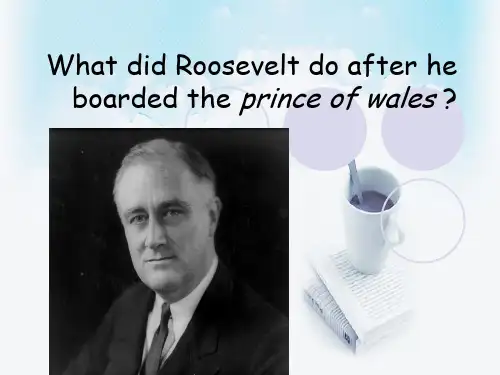
第一课利用时间的要旨埃尔伍德·N·查普曼时间真是不好对付,既难以控制好,又很容易浪费掉,当你向前看时,你觉得你的时间用不完。
例如,在一个学期的开始,你或许觉得你有许多时间,但到学期快要结束时,你会突然发现时间快用光了,你甚至找不出时间把所有你必须干的事情干完,这样你就紧张了。
答案是什么呢?控制。
时间是危险的,如果你控制不了时间,时间就会控制你,如果你不能让时间为你服务,它就会起反作用。
所以,你必须成为时间的主人,而不是它的奴仆,作为刚入学的大学生,妥善安排时间是你的头等大事。
时间是珍贵的,浪费时间是个坏习惯,浪费时间就像毒品一样,你越浪费时间,就越容易继续浪费下去,如果你真的想充分利用上大学的机会,你就应该把利用时间的要旨付诸实践。
要旨一、从一开始就控制时间。
抓紧时间就是抓紧当前的时间,不要把事情推到明天或是下周,在学期开始就开始计划。
要旨二、养成用笔记本的习惯。
马上去买个笔记本,用它来计划你每一天的时间,一旦订好下每周的学习计划,每周就要这么做,但容许有些小的变动,星期日是制订下周计划的好时间。
要旨三、要现实些。
你从经验里就会知道写一篇短文,准备小考或为期术考试复习需要多长的时间,当你为这些事情计划时间时,要现实些,要留有余地,要预计发生意外的事情,否则你的整个计划就会被打乱。
要旨四、为每节课至少计划1小时。
你为每节课安排多少学习时间,取决于4个因素:(1)你的能力;(2)该节课的难度;(3)你希望取得的分数;(4)怎样有效利用你的学习时间。
有一件事是肯定的:你应该为每节课至少安排1小时,在很多情况下会需要2到3小时。
要旨五、灵活安排计划。
每周重新安排时间很重要,这样才能在必要时对计划进行调整。
例如,在期中或期末考试前,你要给复习留下更多的时间。
好的计划必须是有一些灵活性,这样便可做好特别的项目。
要旨六、有课的日子每天都要抽出一些时间来学习。
每天都踏踏实实地学习一会儿,比一天学习很长时间,第二天什么也不学要好。
综一上册课后翻译Lesson one一、written workTime is important .Everyone has 24 hours in a day ,and 365 days in a year. Once a day runs out in our life,it will never come back again.If we love our lives,we shouldn't waste time.we must control time.The best way to use time is to plan it well.When making the study plan,we should remember two things .First ,be realistic.Don't try to do too many things .Second ,a good study plan should be flexible .We may make some small changes,but follow the same pattern.Let's be the master of time ,start our plan now.二、1、I have run out of food ,I must go to buy some.2,You have said so ,you should put them into practice .3.It takes at least two hours to get there by bus.4.Although we failes,at least we tried our best .5.you speak louder so that everyone can hear you.6.How long has it taken you to write that article?7.You seem to be very sad .Tell us what has happened so that we may help you.8.We should keep our classroom clean.9.We may asd Xiao Wang to help us ,he seems to have a lot of time.10.My brother will come to Beijing next week. he must make good use of time to stay here.三、用本课的动词句型1。
Unit 14一、词汇短语Text 1Vocabularyphilanthropist [] n. 慈善家【例句】The university was founded by a millionaire philanthropist.这所大学的创建人是位腰缠万贯的慈善家.domestic [] adj. 家的,家庭的,家用的;(动物)非野生的,驯养的;国内的,国产的,自制的【例句】A pig is a domestic animal. 猪是一种家畜。
【助记】dom(家)+estic(…的)→家庭的;do做,me我,st(one)石头,ic—IC卡。
为我做石头IC卡的人是我的家仆,佣人。
【派生】domestically adv. 国内地;家庭式地;适合国内地documentary [] adj. 文件的,书面(证明)的,证件的;(影片、电视节目等)纪实的,纪录的n.纪录影片,纪实节目,纪实小说【例句】This is a documentary on drug abuse. 这是一本关于滥用毒品的文献screen [] n. 屏,幕,帘,帐,隔板;银幕,荧光屏v. 遮蔽,隐藏,掩护;甄别,选拔;放映或播放(影片或电视节目)【例句】The row of people screened the parade from our view. 人墙遮住了视线,我们看不到游行。
【词组】screen…from 掩蔽,遮蔽…以防…behind/under a screen of 在…的掩护下screen out 筛选出…诉状,起诉书;<尤美>刑事起诉书;控告,起诉i n. 诉状,起诉书;控告,起诉【例句】The government’s indictment against the three men alleged unlawful trading.政府在对这三个人的起诉书中指控他们从事非法贸易。
desperate [] adj. 绝望的,孤注一掷的;亡命的,不顾一切的【例句】They made a desperate attempt to save the company. 他们为挽救公司作孤注一掷的努力。
Lesson FourteenThe Mystery of the Silver BoxMystery 秘密Businessman 商人State 陈述,说明Crime 犯罪,罪行Leak (秘密等)泄露;泄露(秘密等) Secrecy 秘密(的状态),保密Dozen 一打,12个Competitor 竞争者Detail 细节;详情Steal 偷,窃取,行窃Recently 最近,近来Salesman 推销员Industrial 工业(上)的,产业(上)的,工业用的Demonstrate 展示,演示,示范Truly 真正地,确实地On-the-spot 现场的Staff 员工,职员,工作人员Product 制品,产品;产物,成果Drill 钻机,钻床,钻头Dictate 口授,口述;听写Outline 概述,简略叙述要点Intend 打算,意图Human being 人,人类Unbeatable 竞争不过的,无法与之竞争的Offer 出价Address 写上收件人姓名及地址Sheet (纸等薄物的)一张,薄片;被单,褥单Seal 密封(信封等)Frank 率直的,毫不掩饰的Frankly 坦率地,坦白地Curiously 好奇地,感兴趣地Nevertheless 虽然如此,然而,不过Why 用以表示惊讶等Blank 空白的Remark 说(出)Puzzle 使困惑,使伤脑筋Detective 侦探Astonishment 惊奇,惊异Receiver 电话听筒Busy (电话)占线的Dictation 口述,口授,听写Extension (电话)分机Attach 安装,系上,缚上Tremble (因恐惧、寒冷、虚弱等)颤抖Weakly 无力地Connection 联络;连接Useful ExpressionsTurn to 转向As many/much as 多达, ……之多At first 首先,起先At a …..price 以……的价格Hear of /about 听到……关于……Give orders (to do sth.) 下令(做某事)Attach to 安装上,系或缚上Look on 旁观(be) at stake 濒临危险,生死攸关A hundred lives are at stake now.In detail 详细的The soldier reported what he had seen to the general in detail.In time (for sb to do ) 即使,赶上He is back in time for the meeting.Carry out 执行,贯彻He refused to carry out orders which he thought were wrong.Or so 大约,左右I need twenty or so students to help me.Work out 弄明白,推算出Can you work out the meaning of the word in this context?Hang up 挂上电话He hung up when he recognized the voice at the other end of the phone.Might ( just) as well do sth. 不妨,不如Since you need the book badly, you might just as well buy a copy though it is expensive.Translate1)这本书花了我10元钱This book costs me ten yuan.2)他转向经理大声嚷道: “可是我们的工作快要保不住了!”He turned to the manager and said in loud voice: “but our work is at stake.”3),让我来判断谁是谁非Say it to me in detail. I’4)那时候计算机还是新事物,我花高价买了一台.At that time, the computers were new things and I bought one at a high price.5)这位总统头上挨了一枪,当即死亡6)买这辆旧自行车我花了150元左右I spent 150 yuan or so on this used bike.7)无论干什么工作,我们都应履行自己的职责.Whatever work we do, we should carry out our duty.8)起先,没有人能弄懂死者留下的秘密留言At first, no one understood the secret massage left by the dead.9)挂了电话我才想起忘了问他这件事.I didn’t remember to ask him about the matter until I hung up.10)他既不懂英语又不懂汉语.He doesn’t know Chinese as well as English.11)他回家正好赶上看电视台的国际新闻.He came home in time for watching the International News on TV.12)经理下星期才能回来.你不妨把东西放在秘书那里.Since the manager will be back next week, you might just as well give it to the secretary.21)我相信他是诚实的I believe him honest.2)这件外套可以使你暖和This coat may keep you warm.3)小男孩使他爷爷和奶奶生活得更高兴The little boy makes his grandparent’s life happy.4)那个老师把课讲得很有趣That teacher kept his class alive.5)警察到来时,发现那位老人已死了When the police came, the old man had been found dead.Questions on the text1)Who was Mr. Grayson? What did he sell? How did he sell them?He sold machines and tools used in factories.He sent his salesman to a new industrial area out West to demonstrate some new machines.2)Why was it important to keep his plans secret?Because his plans were large; he had millions of dollars at stake.If he did not keep his plans secret, he would lose much money.3)What had been happening over the last eight weeks?Half a dozen times over the last tight weeks, his plans had become known to his competitors , even in smallest detail, and in time for his competitors to steal his customers.4)Who was The Thinking Machine? What did Mr. Grayson want him to do?The Thinking Machine was a detective.Mr. Grayson wanted him to find out how and when information was leaking from his office.5)Who else knew of Mr. Grayson’s plans before he gave orders to carry them out?Mr. Grayson’s personal secretary, Evelyn Winthrop knew his plans before he gave orders to carry them out.6)How long had Miss Winthrop worked for Mr. Grayson? He trusted her, didn’t he? Howdid she get to know of his plans?Miss Winthrop had worked for Mr. Grayson for six years.Yes, he trusted her.Mr. Grayson dictated to Miss Winthrop in his office some letters of to his district managers.7)What was the most recent information leak at Mr. Grayson’s office?The most recent information was that he planned to sent salesmen to Okalahoma with new oil drills.8)What was so strange about this leak? What did Mr. Grayson plan to do in Oklahoma?What did he tell his district managers in the letters? Did any manager know the contents of all the letters? Did Mr. Grayson think Miss Winthrop might have told somebody about the plans?No one knew the contents of all the letters. Miss Winthrop and the businessman himself were the only two human beings who knew what was in them all. Neither of them left the office all day.9)What did The Thinking Machine do before he went to see Miss Winthrop?The Thinking to a desk, addressed an envelope, got a sheet of paper andthe envelope.10)What did she say when he handed the envelope to her? And what did she do?She repeated the name as if it sounded strange to her and said she didn’t think she knew him.11)What did The Thinking Machine find about the silver box beside Miss Winthrop’stelephone?The Thinking Machine found the telephone connection beside Miss Winthrop’s telephone. 12)How did The Thinking Machine find out the secret of the silver box? How had Mr.Grayson’s plans been reaching his business competitor?The Thinking Machine arranged for a secret extension to be attached to Miss Winthrop’s phone. The next morning he was at the extension, pencil in hand, while Mr. Grayson carried out his orders.His plans had been reaching his business competitor with the telephone connection.。